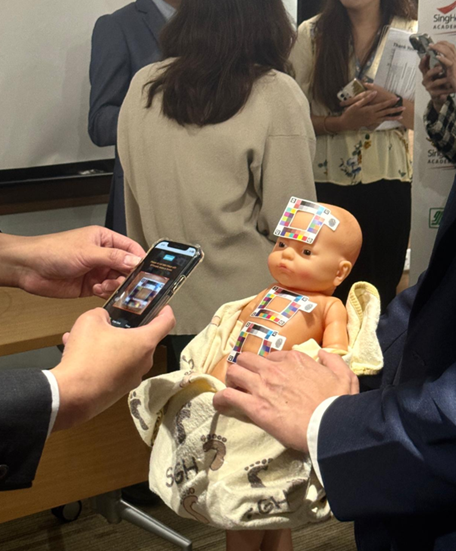BiliSG uses specially developed colour calibration stickers to ensure accurate readings
Exhausted, sleep-deprived and still healing from childbirth, the last thing a new mother wants to do is leave the comfort of her home to bring her infant to the clinic, especially not multiple times within the first few weeks of their fragile little lives.
However, with approximately over 60% of full-term and 80% of pre-term babies in Singapore developing jaundice in their first few weeks of life, this constant back and forth from their cribs to the clinic has been an unfortunate reality for many Asian babies and their parents. And that's exactly what the new BiliSG app aims to change.
Singapore General Hospital (SGH), in collaboration with SingHealth Polyclinics (SHP) and national HealthTech agency Synapxe, has developed an AI-powered smartphone app to enable parents to screen their babies for neonatal jaundice in the comfort and safety of their homes. The app BiliSG, was named after bilirubin, a yellow pigment resulting from the natural breakdown of red blood cells that causes the yellow tint seen in jaundice. As compared to current methods of using a light-emitting handheld device to measure the yellowness of the baby's skin or a heel prick to obtain a blood sample, this app boasts a novel approach to taking readings using just a smartphone, by capturing pictures from the infant's forehead, chest and abdomen to accurately predict bilirubin levels.
The study was conducted in two phases: Phase 1, which focused on app development and initial machine learning model creation, while model validation was performed in Phase 2. In Phase 2, 352 clinically stable infants born at 35 weeks of pregnancy or more and within 21 days of age, underwent three forms of jaundice test (blood test, non-invasive handheld light waves and BiliSG) before another 194 infants were recruited to validate the app. The app has achieved a 100% sensitivity rate in which no cases of significant jaundice were missed in all 546 trial cases.

A user trying out the BiliSG app's screening function to detect jaundice
As senior author Clinical Associate Professor (Dr) Tan Ngiap Chuan, Director of Research and Primary Care Research Institute (PCRI), SHP and Vice-chair, Research, SingHealth-Duke NUS Family Medicine Academic Clinical Programme (FM ACP) commented, "This novel tool will be a game changer in infant care in Singapore and beyond. It will transform the way we protect the brain health of babies by ensuring their jaundice is monitored closely by their parents in a convenient setting and with the safeguard and supervision of their family doctors via telemedicine."
Early detection and near-constant surveillance will also prevent these babies from developing severe neurological defects such as bilirubin encephalopathy and cerebral palsy – both of which may result from untreated severe neonatal jaundice.
While the app has achieved 100% sensitivity rate in all 546 cases trialed, the research team aims to test another over 2,000 babies in the next 18 months across a wider range of smartphone operating systems and camera specifications to further validate the app and ensure its accuracy before it is released to the public. The launch of BiliSG highlights SHP's commitment to integrating AI and innovation in current care models, and foster partnerships to improve health in the community and beyond.
Co-author, Clinical Assistant Professor (Dr) Moosa Aminath Shiwaza, Consultant, SHP-Bukit Merah added, "This innovative smartphone application will empower parents to screen their newborn's jaundice levels at home, potentially reducing the need for frequent hospital visits and enabling timely interventions. With its high accuracy and user-friendly interface, this tool is a breakthrough in newborn jaundice screening."
BiliSG is expected to be commercially available in Singapore within the next two years.
Not yet subscribed to our e-Newsletter? Sign up here today!
